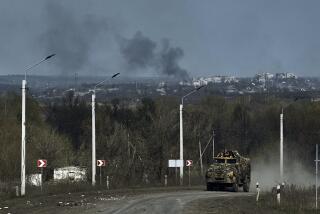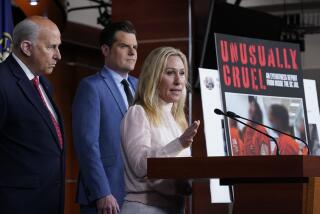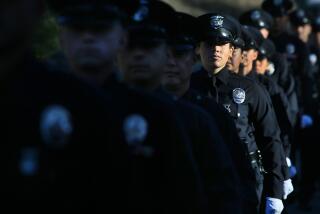Bush Views More Photos
WASHINGTON — President Bush, making an unusual visit to the Pentagon on Monday, viewed still-secret photographs of U.S. soldiers mistreating Iraqi prisoners and said Defense Secretary Donald H. Rumsfeld was doing “a superb job” for which the nation owes him “a debt of gratitude.”
Defense officials were weighing whether and how to release the remaining images to members of Congress and the public. Pentagon spokesman Lawrence Di Rita said the photographs, which a senior military official said number more than 1,200, included “inappropriate behavior of a sexual nature.” Di Rita did not elaborate.
The president viewed about a dozen images, White House Press Secretary Scott McClellan said, including photographs and still images taken from video footage, most of which have not been made public.
“The president’s reaction was one of deep disgust and disbelief that anyone who wears our uniform would engage in such shameful and appalling acts,” McClellan said. “It does not represent our United States military, and it does not represent the United States of America.”
Photographs that have already been published and broadcast of U.S. soldiers forcing Iraqi prisoners into sexually degrading situations have set off a furor in the Muslim world and undermined American credibility in Iraq. In Congress, the scandal has prompted calls from Democrats for Rumsfeld’s resignation. Some Republicans are backing Rumsfeld, but others have said they are reserving judgment until they learn more facts.
Before viewing the images in Rumsfeld’s office, Bush read a 12-minute statement to a small group of reporters that praised the secretary of Defense for “courageously leading our nation in the war against terror.”
“You’re doing a superb job,” Bush said in his strongest statement of support since the scandal erupted. “You are a strong secretary of Defense, and our nation owes you a debt of gratitude.”
A military official who has seen the photos said that one depicts soldiers sodomizing prisoners with chemical lights and another depicts sex between two U.S. soldiers. The official could not confirm a CNN report that said a video exists that shows guards fondling and kissing a female detainee.
“They apparently show some fooling around and some horseplay. There are some that show detainee abuse,” the official said. He added that of the more than 1,200 images being reviewed by Pentagon investigators, fewer than 400 are “bad.”
It appeared Monday that the Pentagon would make some, but not all, of the images available to some members of Congress, but details were still under discussion.
“We haven’t ruled [release] in or out,” Di Rita told reporters at the Pentagon.
The Pentagon’s inching toward release of the images and the president’s show of support for Rumsfeld did not quell congressional clamor over the abuse scandal. The Senate adopted a resolution, 92-0, Monday to condemn “in the strongest possible terms the despicable acts at Abu Ghraib prison,” the detention center near Baghdad where the photos involving U.S. personnel that have come to light were taken.
“This body is shocked,” Senate Majority Leader Bill Frist (R-Tenn.) said on the Senate floor. “We cannot undo the abuse those Iraqi prisoners suffered but we can, through our actions, show the Iraqi people that the transgressions of a few do not represent America.”
Congressional committees have scheduled new hearings for this week. Today, the Senate Armed Services Committee will take public testimony from Army Maj. Gen. Antonio M. Taguba, whose secret report on Abu Ghraib set the prisoner abuse scandal in motion, and from Stephen A. Cambone, undersecretary of Defense for intelligence. Cambone may be pressed on whether intelligence officers asked military police to arrange prison conditions so that the Iraqi detainees would be more likely to talk during interrogations.
Rumsfeld, who apologized for the prisoner mistreatment during testimony to the Senate and House armed services committees on Friday, is expected to find himself under sharp questioning again Wednesday, when he appears before the Senate defense appropriations subcommittee.
Senators are expected to be able to start viewing the photographs within a few days in a secure Capitol room used for intelligence briefings. Senate leaders were still deciding whether the photos would be made available only to members of the Armed Services Committee or to all senators.
There also was disagreement over whether the White House should permit the still-classified photographs to be released to the public. The images that have come to light so far were not released by the government but were obtained by CBS News and the New Yorker magazine. They have since been reprinted in newspapers and shown on TV broadcasts across the country and around the world.
Sen. Lindsey O. Graham (R-S.C.), a member of the Armed Services Committee, said he would like to see the new images of prisoner abuse made public.
“The way the other photos came out was a P.R. disaster and was beyond just a P.R. disaster,” Graham said in an interview. “It had a detrimental effect on the war on the terror. Let’s not repeat the same mistake twice.”
Sen. Pat Roberts (R-Kan.), another member of the committee, said he also favored a full public disclosure of the photos. “I don’t think you gain anything by holding anything back, because it’s going to come out sooner or later.”
Sen. Dianne Feinstein (D-Calif.) said, “I think we [senators] ought to see them. I can’t tell you whether the public should see them. I think the public has enough of a sample to know what went on.”
Lawmakers who question the wisdom of making the photographs public say their release might jeopardize the investigation and prosecution of U.S. personnel in the abuse scandal.
McClellan, the White House press secretary, declined to indicate whether Bush believed the undisclosed images ought to be released to Congress and the public, saying that the president was waiting for a determination from the Pentagon.
“[Military officials] have to take into account privacy concerns, and they have to take into account concerns related to ongoing criminal investigations,” McClellan said. “I don’t think they want to do anything that would compromise ongoing criminal investigations.”
Bush travels only infrequently across the Potomac River to the sprawling Pentagon complex, because military officials can brief him in the White House over a secure video linkup. White House officials said the visit, his sixth since taking office, had been in the works for several weeks and was not initiated so that the president could view the photos.
McClellan offered no explanation for the trip other than that the president likes to visit the Pentagon “from time to time.” During the visit, Bush received a briefing from commanders on Iraq and gave an interview to Armed Forces Radio and Television.
“The United States has a vital national interest in the success of free institutions in Iraq as the alternative to tyranny and terrorist violence in the Middle East,” Bush said after the briefing. “As we carry out this mission, we are confronting problems squarely, and we are making changes as needed.”
Amid outrage in the Arab world over U.S. treatment of the detainees, Secretary of State Colin L. Powell decided Monday to visit Jordan this weekend for an international conference that would allow him to meet with a variety of Arab foreign ministers and other dignitaries.
Richard Boucher, the chief State Department spokesman, said Powell’s appearance at the World Economic Forum would give the secretary a chance to speak with leaders about Iraq, the Israeli-Palestinian conflict and other U.S. interests.
But a senior Republican lawmaker said a key purpose of the visit was to discuss the scandal and try to overcome the diplomatic problems it has created.
On the campaign trail in Pennsylvania, Sen. John F. Kerry, the expected Democratic presidential nominee, was asked to comment on the upcoming court-martial of a 24-year-old former military policeman, the first scheduled in connection with the abuse scandal, which officials announced Sunday. Seven former soldiers at the Abu Ghraib detention center are facing criminal charges.
“I’m very, very concerned about the way this is proceeding, the lack of accountability up the chain of command on a rapid basis,” Kerry said in an interview with a CBS television affiliate in Pittsburgh. “Those young people did wrong, but they didn’t do it all by themselves.”
Outrage continued to percolate through the military. The Army Times and three sister publications, civilian-operated newspapers covering the armed forces, said in an editorial released Monday that responsibility for the scandal goes to the top of the command structure.
“This was not just a failure of leadership at the local command level,” the newspapers said. “This was a failure that ran straight to the top. Accountability here is essential -- even if that means relieving top leaders from duty in a time of war.”
Times staff writers Richard Simon and Paul Richter in Washington and Maria L. La Ganga in Edinboro, Pa., contributed to this report
More to Read
Sign up for Essential California
The most important California stories and recommendations in your inbox every morning.
You may occasionally receive promotional content from the Los Angeles Times.










